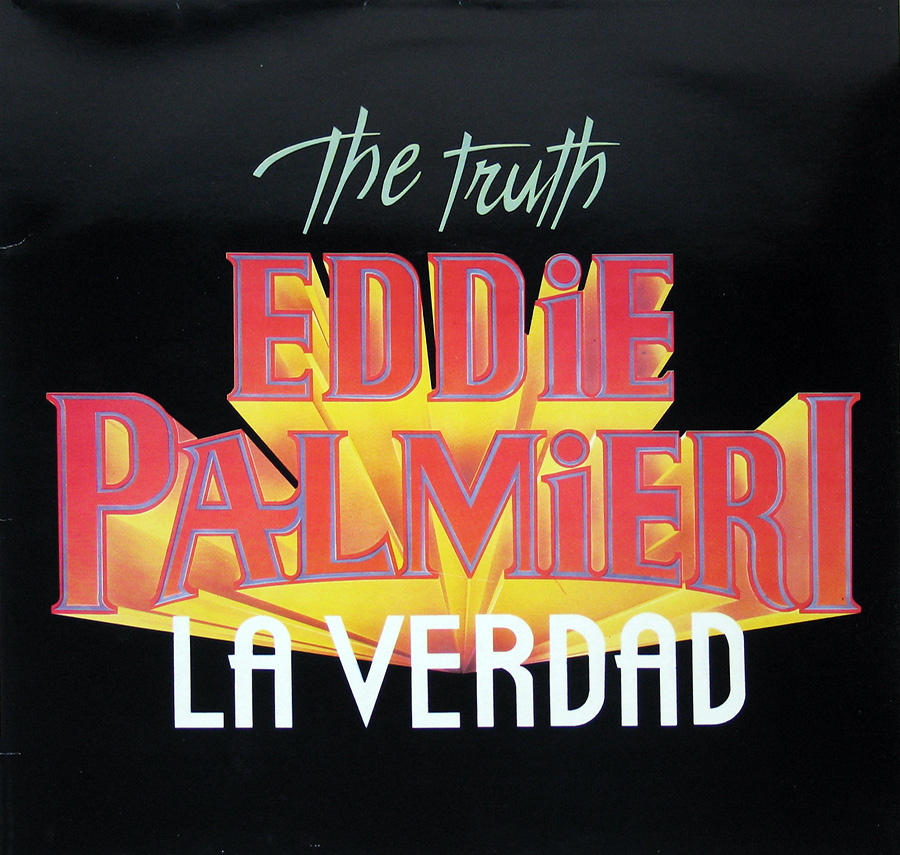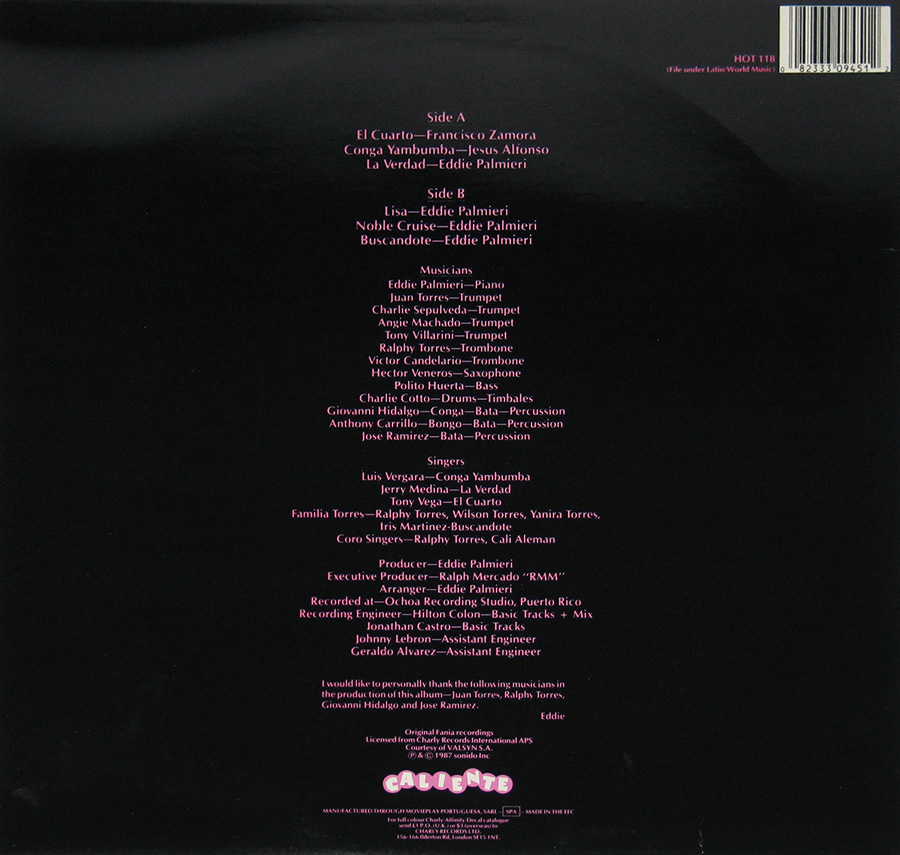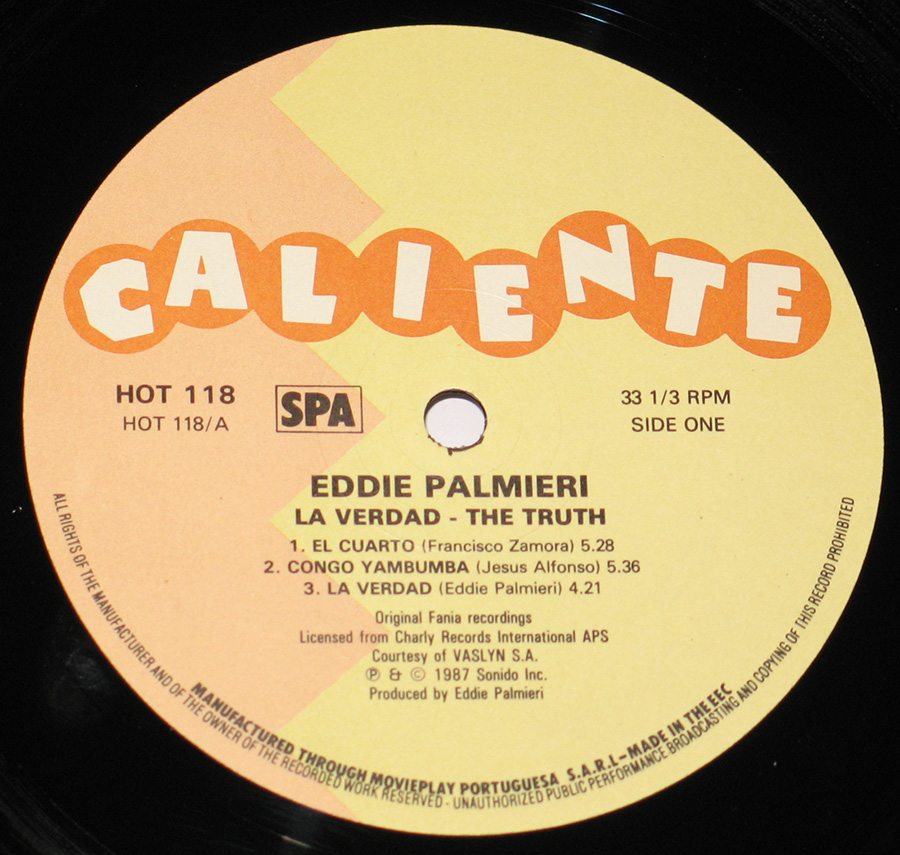"LA VERDAD" Album Description:
Historical Context: 1987 and the Latin Music World
The year 1987 was a transitional moment in global music. Pop and rock were dominated by artists such as U2, Madonna, and Michael Jackson, while hip-hop was gaining momentum in the United States. In Latin music, salsa had already moved beyond its golden era of the 1970s but remained vibrant through evolving production techniques and the rise of new voices. New York and Puerto Rico continued to be the cultural hubs where salsa thrived, while European markets like Spain and Portugal showed growing interest in Latin music, helping explain why "La Verdad / The Truth" was also manufactured in Portugal.
Genre Exploration: Salsa Meets Latin Jazz
Eddie Palmieri is recognized not just as a salsa pioneer but as one of the few bandleaders to consistently infuse jazz harmonies into Afro-Caribbean rhythms. "La Verdad / The Truth" is situated at the crossroads of Latin jazz and salsa dura, featuring the energy of hard-hitting trombone arrangements, rhythmic innovation, and improvisational passages that reflect PalmieriÕs jazz roots. During this same era, groups like the Fania All-Stars had already defined the salsa collective spirit, while artists such as RubŽn Blades, Willie Col—n, and HŽctor Lavoe were experimenting with storytelling and politically charged lyrics within the salsa framework.
Musical Exploration in "La Verdad / The Truth"
On this album, Palmieri explores both the traditional dance floor appeal of salsa and the cerebral complexity of Latin jazz. Tracks such as "El Cuarto" and "Congo Yambumba" tap into Afro-Cuban folkloric traditions with their rhythmic depth, while "Noble Cruise" and "Lisa" lean into jazz-inflected harmonies and instrumental exploration. The title track, "La Verdad," stands as a manifesto of sorts Ñ bold, rhythmic, and unapologetically Palmieri in its fusion of groove and intellect. The album balances vocal-driven numbers with expansive instrumental sections, illustrating PalmieriÕs ongoing search for new textures in a genre often bound by formulas.
Key Persons Behind the Recording
The production was helmed by Ralph Mercado, founder of RMM Records, one of the most influential Latin music labels of the 1980s and 1990s. Mercado was a key figure in expanding salsa beyond its niche markets and turning it into a global business. Eddie Palmieri himself co-produced, ensuring his musical vision remained central. A highlight of this album is the collaboration with salsa singer Tony Vega, whose smooth yet powerful vocals provided a perfect counterbalance to PalmieriÕs adventurous arrangements. Vega, who later became a star in his own right, added both warmth and accessibility to the albumÕs more experimental edges.
Band Historical Events and Line-up
By the late 1980s, Eddie Palmieri had already enjoyed over two decades of prominence, dating back to the creation of La Perfecta in 1961, which introduced the trombone-heavy sound that influenced salsa orchestration. His career had weathered changes in audience tastes, shifts in the recording industry, and the decline of salsaÕs commercial dominance in the early 1980s. Collaborations with younger talents like Tony Vega reflected PalmieriÕs adaptability and desire to remain connected to the contemporary salsa scene. This album marked a period where PalmieriÕs ensembles included rotating line-ups of skilled musicians who could handle both traditional salsa dance forms and jazz improvisation.
Controversies Around "La Verdad / The Truth"
The release of "La Verdad / The Truth" stirred debates among salsa purists. Some fans criticized Palmieri for moving too far into jazz territory, arguing that salsa was losing its identity when layered with complex harmonies and extended instrumental breaks. Others felt that his willingness to blend styles kept the genre fresh and prevented it from stagnating. Another point of contention was its European release and distribution, which some critics viewed as prioritizing overseas markets at a time when salsa audiences in Latin America were facing economic hardships that limited access to new vinyl. These controversies, however, only cemented PalmieriÕs reputation as both a visionary and a provocateur in Latin music.
Eddie Palmieri
Eddie Palmieri (born 1936, New York City) is an American pianist, bandleader, and composer of Puerto Rican descent who transformed Latin music with his daring vision. Nicknamed The Sun of Latin Music, Palmieri is celebrated for fusing salsa with jazz, Afro-Caribbean, and experimental rhythms. In 1961 he formed La Perfecta, a groundbreaking band that replaced violins with trombones, revolutionizing the salsa sound and inspiring generations. Over the decades he has remained a restless innovator, equally at home with fiery dance tracks and complex jazz arrangements. Rooted in New YorkÕs vibrant Latino community, PalmieriÕs career spans more than six decades, marked by Grammy Awards, global performances, and a reputation as one of the most influential figures in Latin jazz and salsa history.


